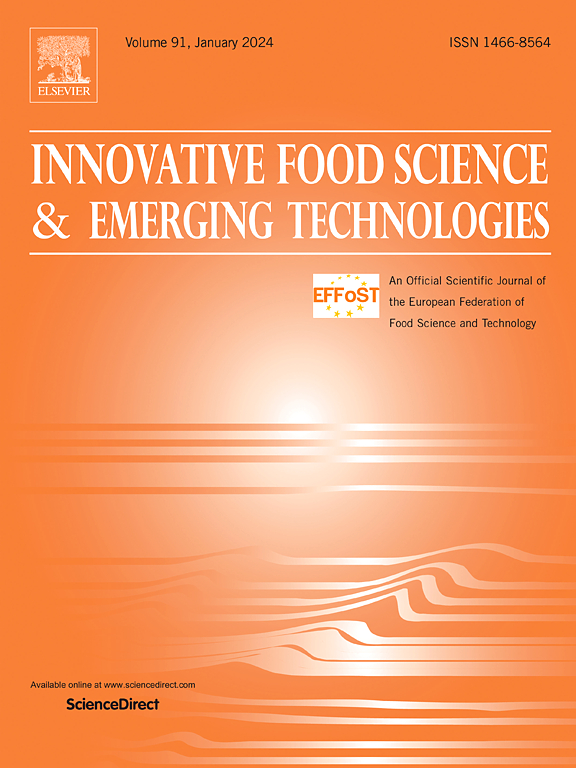对香豆酸-β-环糊精配合物的制备及其对苹果汁中嗜酸性土胞杆菌的抑菌活性研究
IF 6.3
1区 农林科学
Q1 FOOD SCIENCE & TECHNOLOGY
Innovative Food Science & Emerging Technologies
Pub Date : 2025-01-04
DOI:10.1016/j.ifset.2025.103918
引用次数: 0
摘要
为克服对香豆酸(p-CA)溶解度和生物利用度差的问题,制备了p-CA与β-环糊精(β-CD)包合物(p-CA-β-CD)。采用FT-IR、XRD、DSC和SEM对p-CA-β-CD配合物进行表征。此外,还研究了p-CA-β-CD对嗜酸地酸杆菌的抑菌活性及其作用机制。结果证实了p-CA-β-CD的成功制备,并证明了与β-CD络合后p-CA的溶解度显著提高。p-CA-β-CD通过破坏细胞膜,降低细胞内pH和ATP,增加ROS水平,改变细胞形态,有效抑制酸地草,MIC为1.4 mg/mL。在4°C和25°C条件下,p-CA-β-CD浓度为1MIC时,苹果汁贮藏过程中,A. acidoterrestris分别降低2.89和2.18 log,对苹果汁理化指标和感官品质无显著影响。这些研究结果表明,p-CA-β-CD可能是一种新兴的、有前途的控制果汁中嗜酸土霉的天然剂。本文章由计算机程序翻译,如有差异,请以英文原文为准。

Preparation and antibacterial activity of p-coumaric acid-β-cyclodextrin complex against Alicyclobacillus acidoterrestris in apple juice
To overcome the poor solubility and bioavailability of p-coumaric acid (p-CA), an inclusion complex (p-CA-β-CD) of p-CA and β-cyclodextrin (β-CD) was prepared. FT-IR, XRD, DSC, and SEM were performed to characterize the p-CA-β-CD complex. Additionally, the antibacterial activity of p-CA-β-CD against Alicyclobacillus acidoterrestris and the underlying mechanisms were investigated. The results confirmed the successful fabrication of p-CA-β-CD and demonstrated a significant enhancement in p-CA solubility upon complexation with β-CD. p-CA-β-CD effectively inhibited A. acidoterrestris, with an MIC of 1.4 mg/mL, by damaging cell membrane, reducing intracellular pH and ATP, increasing ROS levels, and altering cell morphology. Moreover, 1MIC of p-CA-β-CD caused 2.89 and 2.18 log reductions of A. acidoterrestris during apple juice storage at 4 °C and 25 °C, respectively, without remarkable effect on physicochemical indexes and sensory quality. These findings suggested that p-CA-β-CD could potentially be an emerging and promising natural agent for controlling A. acidoterrestris in juice.
求助全文
通过发布文献求助,成功后即可免费获取论文全文。
去求助
来源期刊
CiteScore
12.00
自引率
6.10%
发文量
259
审稿时长
25 days
期刊介绍:
Innovative Food Science and Emerging Technologies (IFSET) aims to provide the highest quality original contributions and few, mainly upon invitation, reviews on and highly innovative developments in food science and emerging food process technologies. The significance of the results either for the science community or for industrial R&D groups must be specified. Papers submitted must be of highest scientific quality and only those advancing current scientific knowledge and understanding or with technical relevance will be considered.

 求助内容:
求助内容: 应助结果提醒方式:
应助结果提醒方式:


